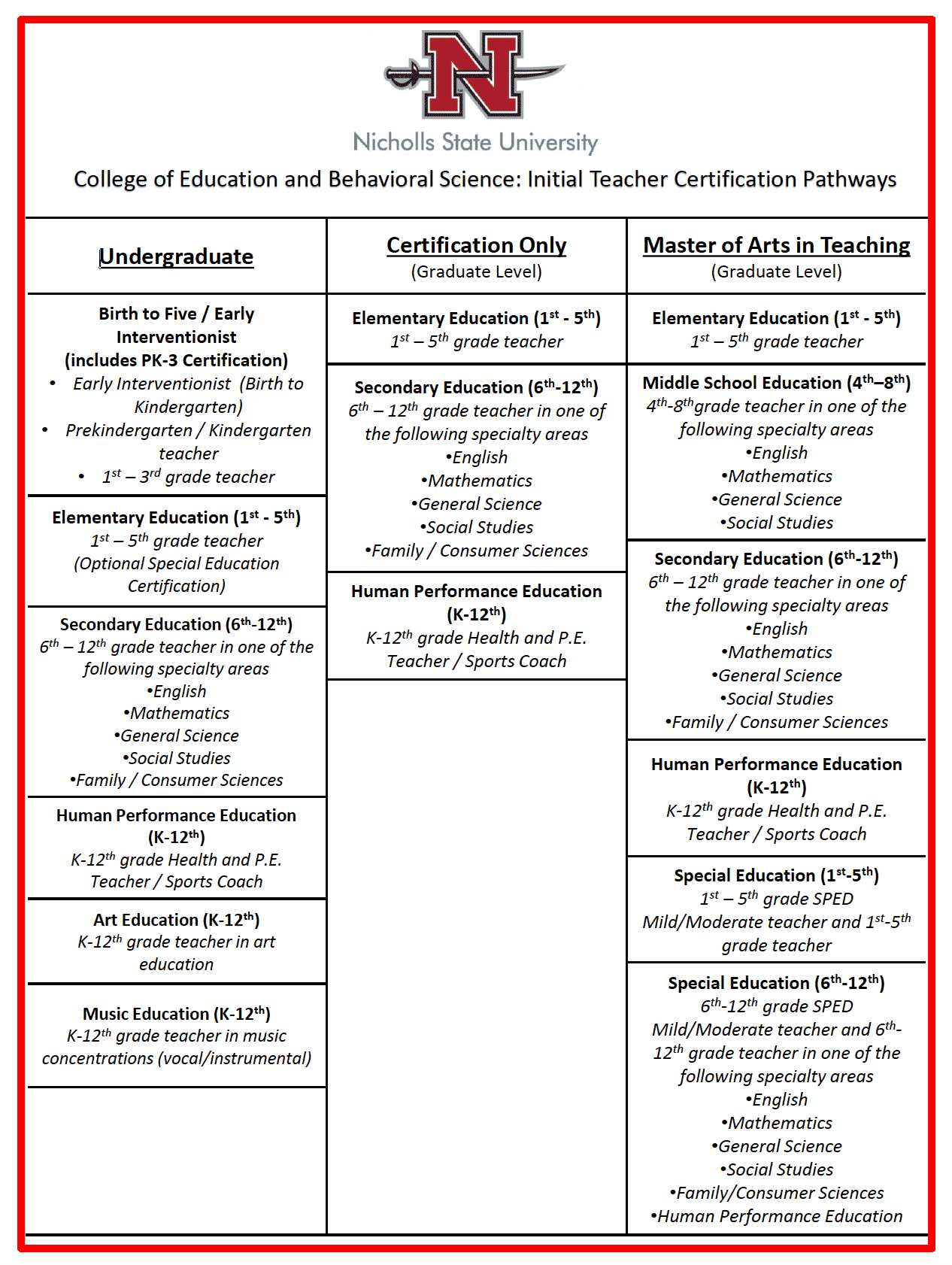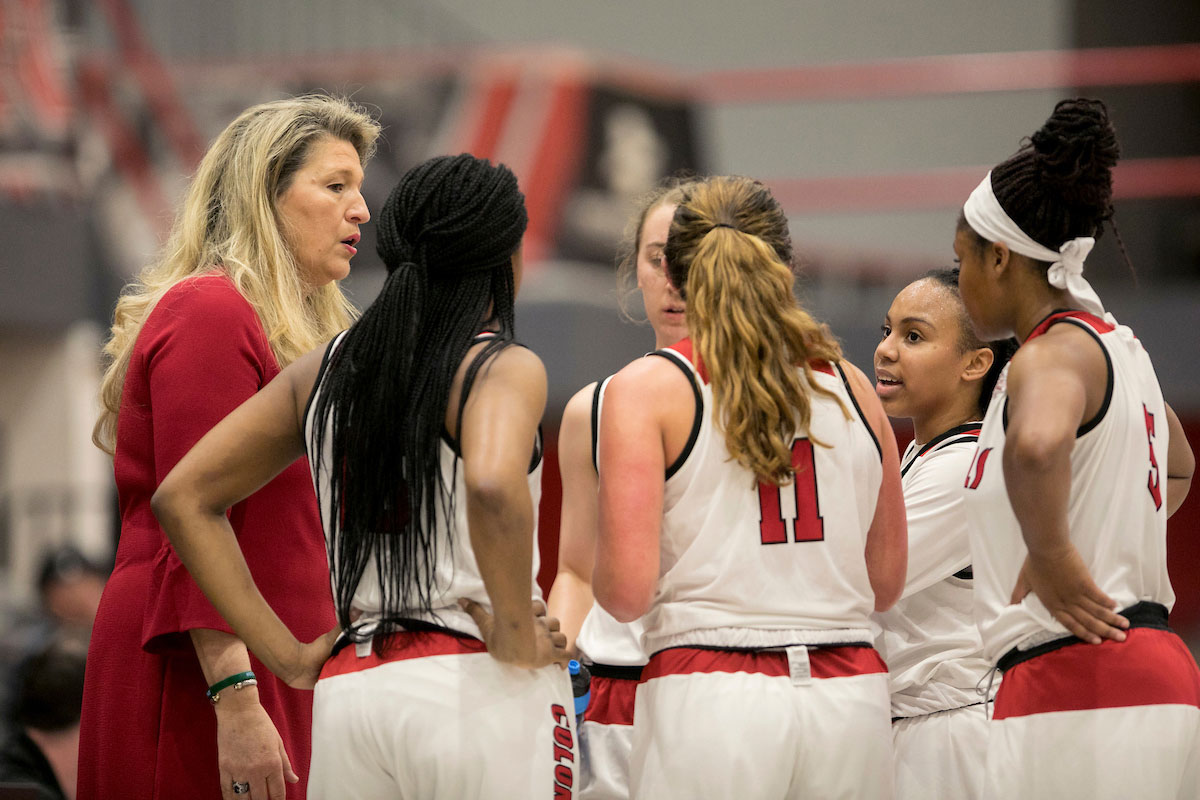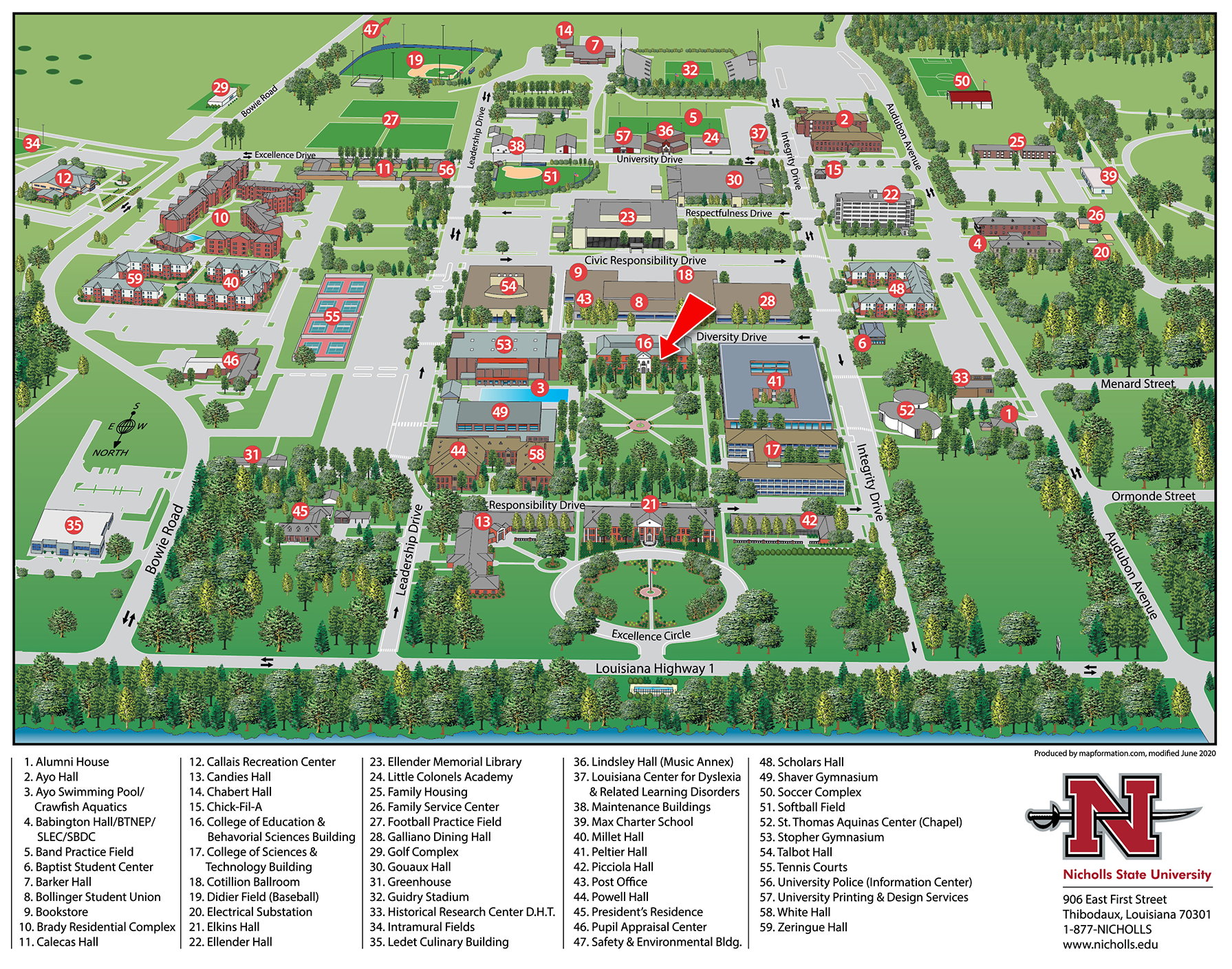Welcome to Teacher Education
Welcome to the Department of Teacher Education at Nicholls State University. Making the decision to become a teacher means that you are making the decision to become the professional that leads to all other professions! In our department, we pride ourselves on preparing teachers who will positively shape the lives of our children. To best prepare our candidates to become effective teachers, we are transitioning from a one-semester student teaching to a year-long residency. This will afford candidates the opportunity to enroll in coursework while learning alongside a highly qualified and certified teacher in a public school setting. It was Benjamin Franklin who said, “Tell me and I forget. Teach me and I remember. Involve me and I learn.” This residency will do just that!
UNDERGRADUATE DEGREE PROGRAMS
Human Performance Education
Social Studies Education
General Science Education
English Education
Family and Consumer Sciences Education
Elementary Education
Birth to Five / Early Interventionist Education
The future of society always rests in the hands of the newest generation. With today’s challenges, there is a great demand for individuals to guide and care for young children, some of whom have already learned that life can be difficult.
The Teacher Certification-Only Program is an innovative recruitment initiative at Nicholls State University to attract outstanding community members to become teachers in schools that need them the most. A background in education is not needed, only a strong commitment to children.
Additional Degree Programs :
Available through other University Departments

In today’s world there is an ongoing effort to quantify many aspects of our society. There is always a need for mathematicians to numerically formulate and solve new problems. There is demand for good applied mathematicians in all areas of our technological world: business, engineering, government, science, and others.

Art education is designed for students who plan to teach art in K-12 grades in public and private schools. Both the Department of Art and the College of Education are committed to the development of highly qualified art education professionals and to providing students with quality experiences within the classroom and in their field experiences.

To become a band or choir director, the MUSV & MUSN concentration allows students to earn certification in vocal or instrumental music education by offering a solid foundation in the study of both music and education.
GENERAL REQUIREMENTS – Teacher Education
The following requirements apply to all teacher education students at various stages of their education:
- All parts of the NTE/Praxis II required for certification must be passed prior to clinical (resident teaching). NTE scores taken after Sept. 1, 1999, are not valid for certification in Louisiana.
- All candidates with a Louisiana Teaching Certificate must complete the minimum requirements for additional certification before the dean of the College of Education can recommend that their certificates be changed.
- A minimum grade of C in all courses is required for the bachelor’s degree and/or certification.
- All candidates must successfully complete EDUC 251 — Introduction to Technology Integration for Teachers.
All candidates who have successfully completed the required methods courses at another college or university may audit one or more methods course(s) at Nicholls State University to become familiar with the conceptual framework of the college.
Candidates will receive credit for correspondence and extension courses taken at other institutions only when such courses have been approved for credit in advance by their adviser and by the dean of the College of Education.
Transfer candidates must meet all of the Admission and Retention Policies within the identified transition points. Each candidate’s transcript must be evaluated by his or her assigned adviser. Transfer candidates must earn a minimum grade of C in all courses required for the bachelor’s degree and/or certification after transferring.
In order to enroll in EDUC 250, EDUC 251, PSYC 206, PSYC 210 and PSYC 220, candidates must have:
- Earned a minimum grade of “C” in all courses required for the Bachelor’s degree and/or teacher certification.
- Earned a minimum of 30 semester hours applicable to a degree. (NOTE: Candidates who have maintained a 2.5 overall grade point average and meet the above course requirements may enroll in EDUC 250 with less than 30 semester hours)
- Successfully completed the following courses with a C or better:
- MATH 101
- ENGL 101 AND 102
- a social science or history
- Science
- Earned a minimum overall grade point average of 2.5 internal GPA.
- Completed a self-evaluation on Content Knowledge, Skills, and Disposition in EDUC 251.
- Completed an Application for Entry to Teacher Education.
- Submitted a Background Check in EDUC 250.
In order to enroll in EDUC 312 and PSYC 311 and be admitted to the teacher education program, candidates must have:
- Earned a 2.5 grade point average.
- Earned a minimum grade of “C” in all courses required for the Bachelor’s degree and/or for teacher education.
- A disposition Evaluation completed by instructor in EDUC 313.
- Completed a self-evaluation on Educator Disposition Assessment
In order to enroll in student teaching and EDUC 456, 458, 465, 467, 473 and 489, candidates must:
- Have earned an overall grade point average of 2.5.
- Have earned a minimum grade of C in all courses required for the bachelor’s degree and/or teacher certification.
- Currently not be on probation or conditional status.
- Have achieved passing scores on all sections of Praxis II required for State of Louisiana Teacher Licensure (certification).
- Have submitted an application to resident teach with a background check.
In order to successfully exit clinical and exit program, candidates must:
- Have earned an overall grade point average of 2.5.
- Have earned a minimum grade of “C” in all courses required for the bachelor’s degree and/or teacher certification.
- Have earned an S (satisfactory) in student teaching,
- submitted a verification form for 180 teaching hours,
- submitted verification form for 60 hours of direct observation and
- submitted a University Coordinator’s Evaluation Form
- earned satisfactory ratings on all evaluation forms (Louisiana Components of Effective Teaching) completed by supervising teachers, university coordinators and school principal
- Currently not be on probation or conditional status,
- Have successfully completed the Resident Teaching Portfolio
- If the portfolio or work sample is unacceptable, the student must meet with evaluators.
- If the second portfolio submission is unsuccessful, the student must meet with the Admission Retention Committee.
Q. Why should I want to be a teacher?
A. What teachers do and say will be absorbed by young minds who will echo those images across the ages. A good teacher awakens interest and kindles enthusiasm. A good teacher teaches children to see the vitality and worthiness of themselves. A good teacher encourages students to marvel, to question and to seek answers. A good teacher inspires tomorrow’s scientists, poets, government leaders, artists, businessmen and those everyday citizens who make our world a place of wonder. If you want to make a difference, become a teacher.
Q. What are the requirements for entering the teacher education program?
A. In order to enroll in the first education course, students must meet the requirements of Portal I: Admission to Foundations Core.
Q. Is there an application process to get into teacher education?
A. Before scheduling the first education course, EDUC 250, students must meet with an adviser in the Department of Teacher Education in Hill Hall. Advisers are assigned by curriculum areas and sometimes by the first letter of the student’s last name. The list is posted around Hill Hall. When students meet with their adviser, they should complete an Application for Entry to Teacher Education form, and their adviser must complete a Verification of Eligibility form. Advisers will provide the forms for students, and both forms must be signed when completed.
Q. What is Praxis?
A. Praxis Series Assessments provide tests and other services that states use as part of their teaching licensing certification process. For teacher certification in Louisiana, education candidates must pass Praxis I and Praxis II. Learn more about Praxis.
Q. How long does it take to get a degree?
A. On average candidates complete the degree in seven to 10 semesters (depending on whether they attend summer sessions and carry a minimum of 15 hours per semester).
Q. I’m thinking of changing careers. Does the teacher education program welcome nontraditional candidates?
A. Nontraditional candidates are truly welcomed. All candidates are treated fairly and with respect.
Q. What is certification?
A. Certification is what allows you to teach. The Board of Elementary and Secondary Education in each state creates the requirements for certification. Every congressional district elects a member to sit on the board. Universities create curricula that fulfill the requirements set forth.
Q.What if I only want to teach a particular grade level?
A. Many candidates want to teach a certain grade; however, in reality you must be certified to teach a range of grades. This increases your marketability when applying for your first job. Once you get your foot in the door, you will be able to transfer into the grade you prefer. After visiting and teaching in the schools during field experiences, candidates often realize that they might enjoy teaching a different grade than they first thought.
Q. What if I want more than one certification?
A. Job opportunities are increased by having more than one certification. You can earn additional certifications by completing the courses required or by successfully passing the Praxis II Subject Assessment for a specific subject area.
Q. Do I need to maintain a certain GPA for the teacher education program?
A. Yes, specific grade point averages are required to enter into and exit the education program. A GPA of 2.2 is required to enroll in the first block of education courses (EDUC 250, EDUC 251 and EDUC 252). A GPA of 2.5 is required to enroll in the second education block (EDUC 312, EDUC 317), to enroll in student teaching and to exit the program.
Q. Is the Nicholls State University College of Education accredited?
A.Yes, for Initial level programs the EPP has Accreditation with Stipulations, and for Advanced level programs the EPP has Full Accreditation with CAEP. Initial and Advanced programs are state accredited by the State Department of Education and the Board of Regents.
Q. What is CAEP?
A. Visit the CAEP website to learn more.
Q. Is there a dress code to be in the teacher education program?
A. Yes. Professional attire is required when completing all field experiences (visiting schools). You are a reflection of Nicholls and are expected to be professional at all times. You are not required to wear professional attire to classes.
Q. What are field experiences?
A. All education courses require you to visit schools to complete different assignments. A field experience coordinator assigns all candidates to schools within Region III. Schools are designated as partner schools, and teachers are considered partner teachers. Not all schools are in the program; therefore, you are not allowed to choose your schools. Additionally, before finishing the program you must have diverse experiences (different grade levels, cultures, ethnic groups, etc.).
Q. What is residency?
A. During your last year of your program, you will spend two semesters in a classroom setting under the supervision of an experienced, qualified mentor teacher. During this year-long residency, you will get the opportunity to practice teaching for a minimum of 180 hours. In addition to your mentor teacher, university coordinators periodically observe your teaching to provide guidance and assistance when needed.
Q. Do I get to choose where I want to student teach?
A. No. You are allowed to choose the area where you will student teach but not the school. The director of student teaching will place you as close to your home as possible. You are not allowed to student teach where family members are working (as teachers, secretary, janitor, etc.) or where your children attend school.
Q. What is the Admission and Retention Committee?
A. The Admission and Retention Committee monitors the progress of all candidates as they progress through the program. Candidates who do not meet the requirements (interviews, portfolios, etc.) are referred to the committee to receive suggestions for improvements. Additionally, faculty members refer candidates exhibiting unprofessional behavior to the committee. A Professional Growth Plan is developed with the committee to ensure that you are able to successfully complete the program.
CONTACT INFORMATION
College of Education and Behavioral Sciences
220 College of Education and Behavioral Sciences Building
P.O. Box 2053
Thibodaux, LA 70310













